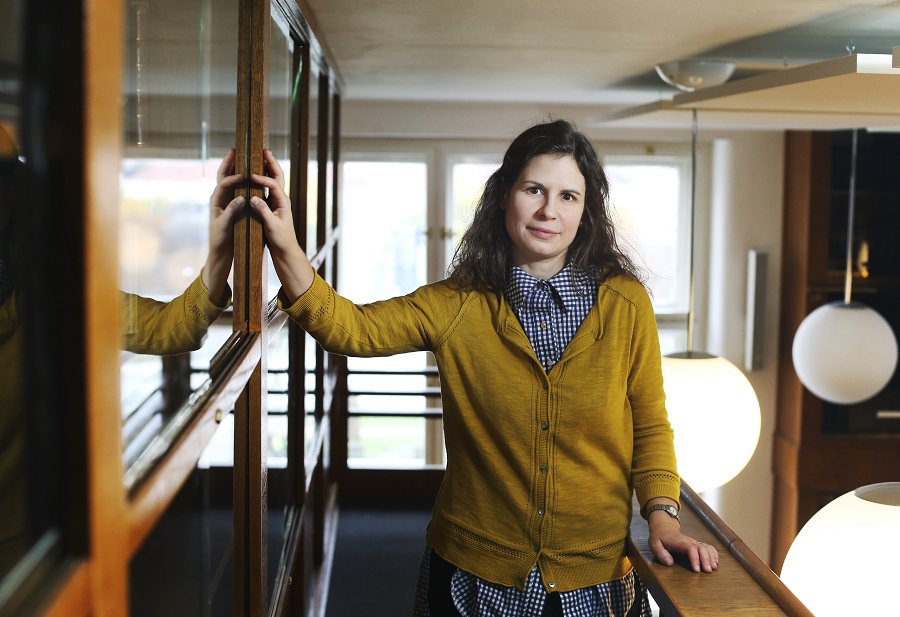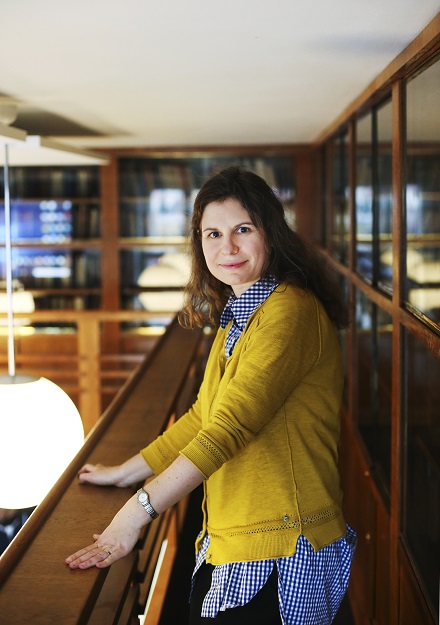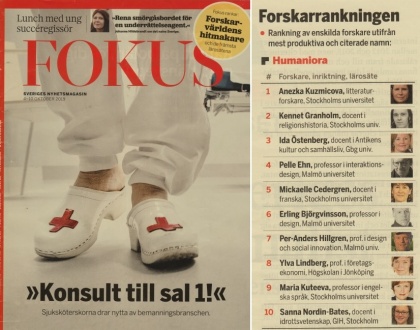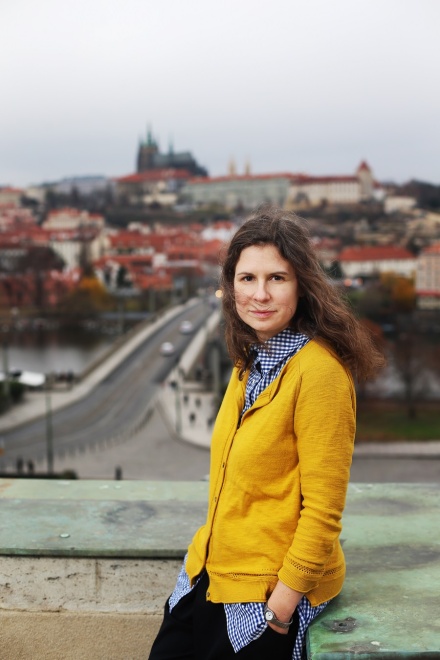Martin Rychlík • foto: Martin Pinkas • 21 July 2020
Reading makes us who we are
CU graduate Anežka Kuzmičová returned to Prague after more than a decade abroad to conduct new research into children’s reading, made possible largely thanks to the Primus programme.

Kuzmičová completed her Master’s in comparative literature and Scandinavian studies at CU’s Faculty of Arts back in 2007; from there, she continued her studies at Stockholm University, where she received her doctorate. Research took her to other places as well: to Denmark, England and Canada. Now – some 12 years later – she’s back at Charles University.
“I had a post-doctoral position in Stockholm that I knew would be ending in January, and had taken some time to complete. In Sweden, you can postpone work – including research – for maternity leave and I had had two children. For the last two years, I had been thinking intensively about what to do next, and we wanted to return to the Czech Republic,” Kuzmičová says. Now she’s researching reading – ultimately how reading informs who we are – at the Institute of Czech Language and Theory of Communication at the Faculty of Arts.
She first prepared to apply with the Grant Agency of the Czech Republic, but the head of the department, Jan Chromý, suggested that she try Charles University’s internal Primus programme as a viable alternative. Primus exists primarily to help young researchers establish new research teams at CU; it started its fifth year in March. Alongside 21 other researchers, Kuzmičová won support and has CZK 4 million at her disposal for her research over the next three years.
Getting to the core of readers’ experiences
Kuzmičová’s focus is research into reading, especially children’s reading, in a natural environment. “I wanted to work in a team that would be formalised in some way. Until now, I’ve held an individual postdoc position, and for the last two years I worked in Bristol; all contacts and collaborations depended on my personal initiative. It was informal academic cooperation, not consolidated by an official grant, so to speak,” she says in Prague.
|
In excellent company |
|
Kuzmičová is among 22 young researchers who received Charles University internal Primus grants for three years to start their own research teams. The largest number of successful applicants so far were from the Faculty of Mathematics and Physics (6 recipients), the Faculty of Science (5 recipients) and the First Faculty of Medicine (4 recipients). |
Kuzmičová’s focus is research into reading, especially children’s reading, in a natural environment. “I wanted to work in a team that would be formalised in some way. Until now, I’ve held an individual postdoc position, and for the last two years I worked in Bristol; all contacts and collaborations depended on my personal initiative. It was informal academic cooperation, not consolidated by an official grant, so to speak,” she says in Prague.
From the start she knew exactly whom and what she wanted. “There are four academics on the team. Each member brings something completely different to the project and that is the main joy for me,” she says. The three-year project is called Integrating Text & Literacy Research (InT&L). Kuzmičová’s senior colleague is Markéta Supa of the Faculty of Social Sciences at Charles University, who researches media education, as well as how children experience media, its messages and narratives. “She’s inspired me a lot. She’s got a lot of experience from abroad and a doctorate from Great Britain. She’s building something that didn’t exist in the Czech Republic,” Kuzmičová says. The researcher is also betting on two younger colleagues who are doctoral students: Jana Segi Lukavská who focuses on children’s culture and Kamila Homolková whose area of expertise includes didactics and communication in education.

For a long time and on an interdisciplinary basis, Kuzmičová has been delving into the depths of reading as a cognitive process and activity, and has published a number of studies. Her work shows, for example, how important the inner experience is for reading, as well as what different reading situations and visual scenes stored in memory do for text comprehension. In other words, she focuses on how books co-create or help form readers’ personalities (and vice versa).
Given the context, it seems natural that a psychologist would be a part of the team, but that isn’t the case. Kuzmičová explains: “I’ve already worked with psychologists a lot, and I will be using them as consultants. This time I’m not planning experimental research. We’re interested primarily in reading in its natural environment. For us it’s about what happens in the field, for example in school. How reading is approached both at home and in school,” she replies, adding that she has already made arrangements at different schools in the Czech Republic. In addition, the team will analyse primary level reading anthologies and leisure books. “We’re aiming at lower primary. In our case it’s from third to fifth grade which is a period when it’s very important to develop reading on a volitional basis. We would like our findings to be applicable. For me, it’s extremely important to build a more lasting relationship with the education sector, but at the same time I realise how difficult the profession is in practice and that there aren’t that many teachers exactly waiting for theoretical advice,” she laughs.
Enjoying learning
Anežka Kuzmičová’s older child transferred from a British school to a regular Czech school. “After returning as a parent, I’ve noticed a few things. It seems to me, for example, that not very many teachers try actively to make the child happy and enjoy learning,” Kuzmičová says. One way to increase enjoyment is through activities promoted by the Reading and Writing for Critical Thinking (RWCT) initiative which trains educators to cultivate the joy of reading in children by sharing experiences and feelings and talking about them.
“The purpose of our project is to see how children are – or could be – led to start perceiving reading as a holistic experience; that it isn’t just something abstract that happens in their heads, but also something that they can experience physically and that can shape them,” Kuzmičová says, adding that reading is also a social activity where, in the words of Ondřej Hausenblas, “people commune with text.” But children have to enjoy it enough to feel motivated to talk about texts in depth. She is interested in how the will to read can be skillfully developed, promoted and stimulated.
Swedish children’s literature used to be a buzzword and category unto itself. What’s it like there today? “The image presented by the media is not surprising: just like here, the perception is that Swedish children don’t read. But of course they do. Some schools have introduced 10 minutes of listening to a self-selected audiobook every morning, so children have a moment of experience and concentration. The teacher doesn’t care what the topic is; what’s important is the setting – ‘now I’m enjoying this and I have the time to notice how I feel,’” Kuzmičová says. She adds that expert and parental experience show how important it is for children in various stages of life to be enchanted by themes presented in books: children then concentrate on selecting what they’re interested in: football, adventure, nature… Early literacy instruction in the Czech Republic apparently focuses on reading for information and then in later stages it is all learning about literature. That risks missing important aspects: experiences, scenes, visualisation and the pure joy of reading itself.
“It’s a shame when teachers don’t tell children anything about how they read themselves,” she says. This is why she wants to teach a new course at the Faculty of Arts called Reading: Theory, Practice, Reflection. During the semester, university students will take one book they’ve long wanted to read but were never able to get around to, and during 12 weeks they’ll read it in a self-reflective style and thoroughly analyse not only the book but above all their own reading processes.

In 2019 the Swedish magazine Fokus published a list of the top researchers in Sweden in which Anežka Kuzmičová came first among researchers in the humanities; “her” Stockholm University was the most successful overall, while Malmö was the most effective.
Results for research and practice
The team intend to use the findings from their research in primary schools and elsewhere in academic publications as well as in developing recommendations for practitioners. Kuzmičová already has extensive experience in this regard; she has been published in academic journals such as Semiotica, Communication Theory, the Journal of General Psychology or Poetics Today. Last October, in a ranking in the magazine Fokus, she was ranked first among all humanities researchers in Sweden, something which surprised her considerably. “I thought they’d made a mistake,” she laughs. The ranking’s methodology was based on work published between 2012 and 2015 and citation tracking adjusted with a subject coefficient, which was overseen by an expert who led the latest reform of Swedish university financing. A religious studies scholar from Stockholm came in second place, while a lecturer in ancient culture from Gothenburg placed third.
What would she say was the most important skill she learned abroad? “Mainly how to work in an environment where nobody knows me. In different countries, even the disciplines look different; it gave me the possibility to define myself, what I do and how I do it, and to concentrate on relatively big topics. And the best decision right at the beginning was to start writing all publications in English,” says Kuzmičová, who originally studied Swedish.
|
Anežka Kuzmičová (37) |
|
Anežka Kuzmičová, Ph.D., literary scholar, originally in Scandinavian studies, returned to CU’s Faculty of Arts in January from work stays at Stockholm University and in most recently Great Britain. Last year, the Swedish magazine Fokus listed her as the most cited humanities researcher in Sweden. She received internal support from the Primus programme and as of 1 January 2020 leads the InT&L research group investigating reading in natural environments and its impact on personality. |

